Did You Know?
A seafarer successfuly completing our DDE program would be eligble to recieve 45 days of sea service credit that can be applied toward service requirements of 46 CFR 11.524(b)(1).

A designated duty engineer (DDE) is defined by STCW as the engineer in charge of a watch in a periodically unmanned engine room. Under US regulations, the DDE may serve as a Chief Engineer on domestic vessels up to 500 grt. The unlimited horsepower DDE credential is valid on any waters. For many industries, including Towing, Offshore Supply, Mega Yachts, or other vessels up to 500 grt, this is an ideal license to obtain as a step towards the higher-level assistant and chief engineer licenses.
Course Curriculum:
1. Engineering Knowledge (General) 1
a) Thermodynamics
b) Applied Chemistry
c) Basics of Computers
d) Engineering Materials
e) Hydraulics
f) Instrumentation & Control Engineering
g) Gas Cutting and Welding
h) Workshop Technology
2. Engineering Knowledge (General) 2
a) Air Compressor
b) Shipboard Ancillary Systems
c) Watchstanding & Emergency Preparedness
d) Fresh Water Generator
e) Heat Exchangers
f) Propeller and Shafting
g) Pumps and Valves
h) Steering Gear
i) Deck Machinery
3. Refrigeration
a) Refrigeration & Air Conditioning
4. Safety
a) IMO Conventions and Maritime Law
b) Emergency Response
c) Firefighting
d) Lifesaving Appliances
e) MARPOL
5. Ship Construction and Stability
a) Ship Construction
b) Ship Stability
6. Motor Plants
a) Auxiliary Boiler Plant
b) Auxiliary Engine
c) Centrifuges
d) Fuel Oil Management
e) Lubrication & Lube Oil Management
f) Main Engine
g) Aux Steam and Gas Turbines
h) Drive Systems
7. Mathematics
a) Mathematics 1
b) Mathematics 2
8. Electricity
a) Basic Electronics for Marine Engineers
b) Marine Electrical Engineering 1
c) Marine Electrical Engineering 2
d) Fundamentals of Electrical Engineering
Did You Know?
What do you like most about your job?
...."standing between two main engines while we are full away; the car size turbo-chargers whining, the "rumble", is very awe inspiring. Then to think, it's your responsibility!"...
Answer from a junior Engineer
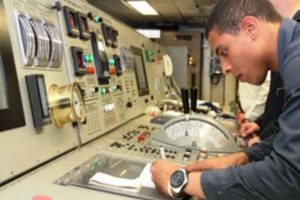
This is a program required for those seeking a QMED - Junior Engineer endorsement. The course provides cognitive and practical mechanical skills required of engineering plant maintenance. This program will satisfy the following requirements:
- Table A-III/4 of the Seafarers’ Training, Certification and Watchkeeping (STCW) Code, as amended, 2010, Specification of Minimum Standard of Competence for Ratings Forming Part of an Engineering Watch.
- The professional examination requirements for 46 CFR 12.501(c)(5) for a national rating endorsement as QMED-Junior Engineer.
Course Curriculum:
Course Outline: Q800 - Junior Engineer Part I
1. Shipboard equipment and systems
a) Air conditioning
b) Ballast
c) Bilge
d) Compressed air
e) Desalination
f) Fuel oil storage/transfer
g) Fuel treatment
h) Heating/ventilation
i) Lubrication
j) Potable water
k) Refrigeration
l) Sanitary/sewage
m) Steering
2. Motor propulsion
a) Air-charge systems
b) Cooling water systems
c) Diesel engine principles
d) Drive systems
e) Fuel service systems
f) Intake/exhaust
g) Lubrication systems
h) Starting systems
i) Waste heat/auxiliary boiler
3. Steam propulsion
a) Auxiliary turbines
b) Boiler fundamentals
c) Combustion principles
d) Condensate systems
e) Drive systems
f) Feedwater systems
g) Fuel service systems
h) Maintenance
i) Safety
j) Steam fundamentals
k) Turbine fundamentals
Course Outline: Q801 - Junior Engineer Part II
1. General Subjects (General Engineering Knowledge)
a) Auxiliary machinery
b) Basic safety procedures
c) Bearings
d) Care of equipment-machine parts
e) Deck machinery
f) Drawings and tables
g) Heat exchangers
h) Hydraulic principles
i) Instrumentation principles
j) Lubrication principles
k) Maintenance procedures
l) Measuring instruments
m) Pipes, fittings, and valves
n) Pollution prevention
o) Properties of fuel
p) Pumps, fans, and blowers
q) Refrigeration principles
r) Remote control equipment
s) Use of hand/power tools
t) Watch duties
2. Electrical
a) A/C circuits
b) Batteries
c) Calculations
d) Communication devices
e) D/C circuits
f) Distribution systems
g) Electronic principles
h) Generation equipment
i) Maintenance
j) Measuring devices
k) Motor controllers
l) Motors
3. Safety
a) Safety and environmental protection
b) Communications
c) Damage control
d) Elementary first aid
e) Emergency equipment
f) Environmental awareness
g) Fire prevention
h) Firefighting equipment
i) Firefighting principles
j) General safety
k) Hazardous materials
Pending USCG Approval
Did You Know?
A reefer ship is a refrigerated cargo ship, typically used to transport perishable commodities which require temperature-controlled transportation, such as fruit, meat, fish, vegetables, dairy products and other foods.
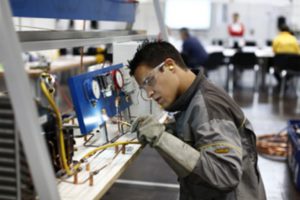
Q802-Electrician:
This course provides an Engine Department personnel with the theoretical and practical knowledge and the skills necessary to perform maintenance and repair operations on ship’s provision storage plants, air conditioning plants, cargo refrigeration, ventilation and dehumidification equipment, as well as pantry refrigerators, water coolers, and ice machines. An introduction to refrigerated container units is also presented.
Q803-Refrigerating Engineer:
This course provides an Engine Department personnel the ability to perform Function: Electrical, Electronic, and Control Engineering at the Support Level; Maintenance and Repair at the Support Level; and Controlling the Operation of the Ship and Care for Persons on Board at the Support Level.
Successful completion of this program will meet the following requirements:
- Training satisfies the requirements of Table 1 to 46 CFR 12.505(c) for Refrigerating Engineer / Electrician examination modules
- Satisfy the professional examination requirements of 46 CFR 12.501(c)(5) for a national rating endorsement as QMED-Electrician/Refrigerating Engineer.
Course Curriculum:
Course Outline: Q802-Electrician
1. General Engineering Knowledge
a) Auxiliary machinery
b) Basic safety procedures
c) Bearings
d) Care of equipment and machine parts
e) Deck machinery
f) Drawings and tables
g) Instrumentation principles
h) Maintenance procedures
i) Measuring instruments
j) Pollution prevention
k) Pumps, fans, and blowers
l) Remote control equipment
m) Use of hand/power tools
2. Electrical
a) A/C circuits
b) Batteries
c) Calculations
d) Communication devices
e) D/C circuits
f) Distribution systems
g) Electronic principles
h) Generation equipment
i) Maintenance
j) Measuring devices
k) Motor controllers
l) Motors
3. Safety
a) Troubleshooting
b) Safety and environmental protection
c) Communications
d) Damage control
e) Elementary first aid
f) Emergency equipment
g) Environmental awareness
h) Fire prevention
i) Firefighting equipment
j) Firefighting principles
k) General safety
l) Hazardous materials
4. Shipboard equipment and systems
a) Compressed air
b) Lubrication
c) Steering
Course Outline: Q803-Refrigerating Engineer
1. General Engineering Knowledge
a) Auxiliary machinery
b) Basic safety procedures
c) Bearings
d) Care of equipment and machine parts
e) Drawings and tables
f) Heat exchangers
g) Hydraulic principles
h) Instrumentation principles
i) Lubrication principles
j) Maintenance procedures
k) Measuring instruments
l) Pipes, fittings, and valves
m) Pollution prevention
n) Pumps, fans, and blowers
o) Refrigeration principles
p) Remote control equipment
q) Use of hand/power tools
2. Electrical
a) Electronic principles
b) Maintenance
c) Measuring devices
d) Motor controllers
e) Motors
3. Safety
a) Troubleshooting
b) Safety and environmental protection
c) Communications
d) Damage control
e) Elementary first aid
f) Emergency equipment
g) Environmental awareness
h) Fire prevention
i) Firefighting equipment
j) Firefighting principles
k) General safety
l) Hazardous materials
4. Shipboard equipment and systems
a) Air conditioning
b) Compressed air
c) Heating/ventilation
d) Refrigeration
Pending USCG Approval
Did You Know?
Oilers are the engine room equivalent of sailors, and are also referred to as wipers. The average annual salary according to the Bureau of labor Statistics is $36,260.
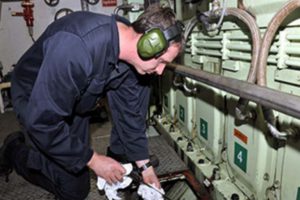
This program is designed for entry level engine room mariners. The program satisfies the training requirements for the General Safety, and Oiler examination modules. This program also complies with the requirements of Standards of Training Certification and Watchkeeping (STCW) Chapter A-III/5 mandatory minimum standard of competence for ratings as able seafarer engine in a manned engine-room or designated to perform duties in a periodically unmanned engine-room.
Course Curriculum:
The course QMED03 Oiler has 2 course units, Q804 Oiler Part I and Q805 Oiler Part II
Course Outline: Q804-Oiler Part I
1. Motor propulsion
a) Air-charge systems
b) Cooling water systems
c) Diesel engine principles
d) Drive systems
e) Fuel service systems
f) Intake/exhaust
g) Lubrication systems
h) Starting systems
i) Waste heat/auxiliary boiler
2. Steam propulsion
a) Auxiliary turbines
b) Boiler fundamentals
c) Combustion principles
d) Condensate systems
e) Drive systems
f) Feedwater systems
g) Fuel service systems
h) Maintenance
i) Safety
j) Steam fundamentals
k) Turbine fundamentals
3. Shipboard equipment and systems
a) Ballast
b) Bilge
c) Compressed air
d) Desalination
e) Fuel oil storage/transfer
f) Fuel treatment
g) Lubrication
h) Potable water
i) Refrigeration
j) Sanitary/sewage
k) Steering
Course Outline: Q805-Oiler Part II
1. Electrical
a) Generation equipment
b) Maintenance
c) Motors
d) Safety
2. General Engineering Knowledge
a) Auxiliary machinery
b) Basic safety procedures
c) Bearings
d) Care of equipment and machine parts
e) Heat exchangers
f) Instrumentation principles
g) Lubrication principles
h) Maintenance procedures
i) Measuring instruments
j) Pipes, fittings, and valves
k) Pollution prevention
l) Properties of fuel
m) Refrigeration principles
n) Remote control equipment
o) Use of hand/power tools
p) Watch duties
3. Safety-environmental protection
a) Communications
b) Damage control
c) Elementary first aid
d) Emergency equipment
e) Environmental awareness
f) Fire prevention
g) Firefighting equipment
h) Firefighting principles
i) General safety
j) Hazardous materials
Pending USCG Approval
Did You Know?
The firemen and watertenders served a major role in the ship's boiler room during the war and made sure that the ships were under steam, even under arduous conditions and high heat in the ship's confine.
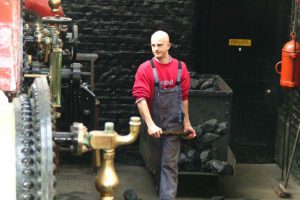
This course includes knowledge of associated machinery and procedures, and a final exam. Completion of the course, along with having the requisite amount of sea service, enables the candidate to gain a Coast Guard endorsement in their merchant marine credential as fireman/watertender.
Course Outline:
1. General Engineering Knowledge
a) Auxiliary machinery
b) Basic safety procedures
c) Care of equipment and machine parts
d) Heat exchangers
e) Instrumentation principles
f) Maintenance procedures
g) Measuring instruments
h) Pipes, fittings, and valves
i) Pollution prevention
j) Properties of fuel
k) Remote control equipment
l) Use of hand/power tools
m) Watch duties
2. Safety and environmental protection
a) Communications
b) Damage control
c) Elementary first aid
d) Emergency equipment
e) Environmental awareness
f) Fire prevention
g) Firefighting equipment
h) Firefighting principles
i) General safety
j) Hazardous materials
3. Shipboard equipment and systems
a) Ballast
b) Bilge
c) Compressed air
d) Fuel oil storage/transfer
e) Fuel treatment
4. Steam propulsion
a) Auxiliary turbines
b) Boiler fundamentals
c) Combustion principles
d) Condensate systems
e) Drive systems
f) Feedwater systems
g) Fuel service systems
h) Maintenance
i) Safety
j) Steam fundamentals
k) Turbine fundamentals
Pending USCG Approval
Did You Know?
Did you know that you can work for the Military Sealift Command with some merchant marine experience as a machinist-pumpman and earn above $60,000 a year.
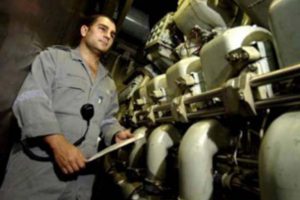
This course covers the requirements of the STCW Convention as amended Chapter V, Section A-V/1-1. The course provides the detailed knowledge to support the training outcomes related to the specification of minimum standard of competence in basic training for oil and chemical tanker cargo operations.
Successful completion of the QMED05 - Pumpman/Machinist course will satisfy the following:
- Professional examination requirements of 46 CFR 12.501(c)(5) for a national rating endorsement as QMED – Pumpman/Machinist
- Tanker Familiarization course requirements of 46 CFR 13.401(e)(1) for an original endorsement as Tankerman-Assistant DL
- Satisfy the Tankerman-Assistant course requirements of 46 CFR 13.609(a)(1) and Table A-V/1-1-1 of the STCW Code, as amended 2010 for an endorsement for Basic Oil and Chemical Tanker Cargo Operations
Course Curriculum:
Course has 2 units, Q807-Machinist; and, Q808-Pumpman.
Course Outline: Q807-Machinist
1. General Engineering Knowledge
a) Basic safety procedures
b) Bearings
c) Care of equipment and machine parts
d) Drawings and tables
e) Lubrication principles
f) Maintenance procedures
g) Measuring instruments
h) Pipes, fittings, and valves
i) Pollution prevention
j) Use of hand/power tools
2. Electrical
a) Safety
3. Safety and environmental protection
a) Communications
b) Damage control
c) Elementary first aid
d) Emergency equipment
e) Environmental awareness
f) Fire prevention
g) Firefighting equipment
h) Firefighting principles
i) General safety
j) Hazardous materials
4. Shipboard equipment and systems
a) Compressed air
b) Heating/ventilation
c) Lubrication
5. Steam propulsion
a) Maintenance
b) Safety
c) Steam fundamentals
6. Motor propulsion
a) Diesel engine principles
b) Lubrication systems
Course Outline: Q808-Pumpman
1. General Engineering Knowledge
a) Auxiliary machinery
b) Basic safety procedures
c) Care of equipment and machine parts
d) Deck machinery
e) Heat exchangers
f) Hydraulic principles
g) Instrumentation principles
h) Maintenance procedures
i) Pipes, fittings, and valves
j) Pollution prevention
k) Pumps, fans, and blowers
l) Remote control equipment
m) Use of hand/power tools
2. Electrical
a) Safety
3. Safety and environmental protection
a) Communications
b) Damage control
c) Elementary first aid
d) Emergency equipment
e) Environmental awareness
f) Fire prevention
g) Firefighting equipment
h) Firefighting principles
i) General safety
j) Hazardous materials
4. Shipboard equipment and systems
a) Ballast
b) Bilge
c) Compressed air
d) Heating/ventilation
e) Lubrication
5. Steam propulsion
a) Maintenance
b) Safety
c) Steam fundamentals
6. Motor propulsion
a) Diesel engine principles
b) Lubrication systems
Pending USCG Approval






